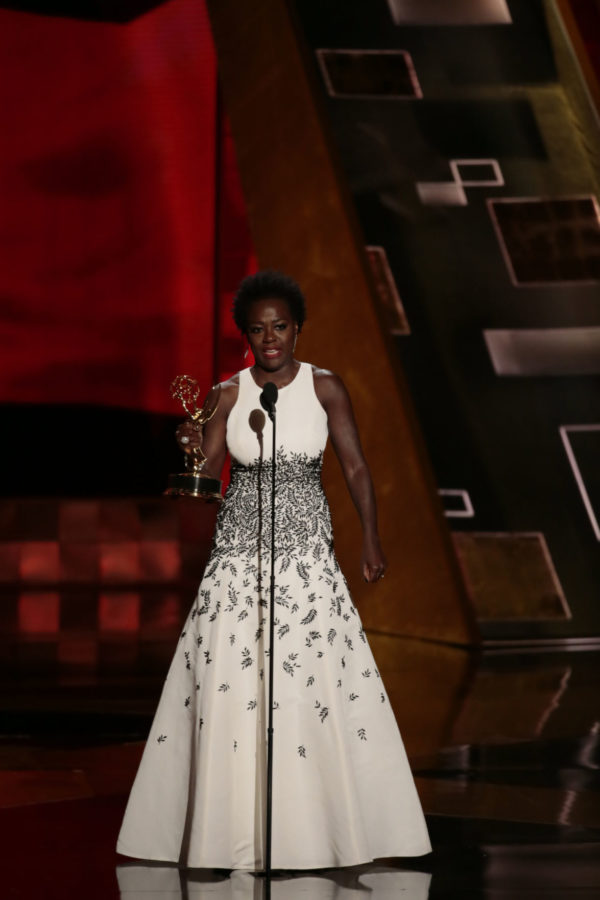Women Occupy Hollywood
Viola Davis during the 67th Annual Primetime Emmy Awards at the Microsoft Theater in Los Angeles on Sunday, Sept. 20, 2015. (Robert Gauthier/Los Angeles Times/TNS)
October 16, 2015
It’s the night of the 2015 Emmy Awards, and the nominees for the Drama Series Lead Actress Emmy Award are read.
Adrien Brody announced, “And the Emmy Award goes to, Viola Davis.”
Davis proceeded to give her acceptance speech, giving voice to the thoughts of many. The truth of what it is to be a woman in the industry, and a black woman at that, spilled out of her mouth.
Davis began, “In my mind, I see a line. And over that line, I see green fields and lovely flowers and beautiful white women with their arms stretched out to me, over that line. But I can’t seem to get there no how. I can’t seem to get over that line.’ That was Harriet Tubman in the 1800s. And let me tell you something: The only thing that separates women of color from anyone else, is opportunity. You cannot win an Emmy for roles that are simply not there.”
As the glare of the bright stage lights bounced off of her ivory gown into the audience, her bold and honest speech traveled through locked arms, chairs, TV screens and into the minds of many watching. Davis stood, picturesque; the view was reminiscent of a scene with a heroine accepting a win after a long fight, while off stage, the war rages on.
The Diane Rehm Show discussed this movement just a few months ago in June. In their Women in Hollywood Gender Equality discussion, it was brought to light that only four percent of all feature films released by a major studio were directed by a women in 2014. In the same year, out of the top 100 earning movies, only 12 percent starred women protagonists.
There is a very narrow scope of roles for women actors that is starting to slowly widen. Type-casting is a hurdle many women actors do not clear. Stereotypical roles for women currently rule the world of film and TV. On top of that, there are exponentially more roles for men than there are for women. As mentioned earlier, the gap is even greater when talking about leading roles.
Much like the majority of scripts written for women, red carpet questions often are reduced to the subject matter of their appearance. Questions from interviewers rarely venture into the artistic realm that the actresses fought to enter in the first place.
In an effort to “Flip the Script,” Elle Magazine has started asking the red carpet males the same simply shallow questions that women are daily bombarded with. Who are you wearing? What are you carrying in your clutch? How long did it take you to get ready?
For African-Americans in the film industry, the norm has been that they generally receive awards for roles that call for blacks to play them. It’s kind of like saying, “You’re really good at playing you.” With many roles not being melanin-friendly, roles are limited and in turn, so are awards.
Until more roles are made available to people of color and to women in general, this glass ceiling will stay between them and their full potential, as well as the full potential of the art of film and TV. Until that glass ceiling is shattered, the beautiful unknown will remain just that, unknown.
Sandra Bullock refused to allow her career to stop at that unknown. Bullock took things into her own hands and went searching for roles that were not typical for her category. Bullock told Entertainment Weekly that she sent out feelers posing this question, “Are there any male roles out there that [the filmmakers] don’t mind switching to female?”
Film producer George Clooney’s next drama inspired by “Our Brand is Crisis”, a 2005 documentary, now features Bullock as a character who was originally set to be played by a male.
In The Hollywood Reporter’s uncensored drama actress round table, Taraji P. Henson gave her thoughts on “Empire” after reading the script for the first time.
“If we do it well, if we handle it well, then it’s going to force people to have conversations that they are afraid to have, and that’s what art is supposed to do, in my opinion,” Hensen said.
And here we are.



























































































































